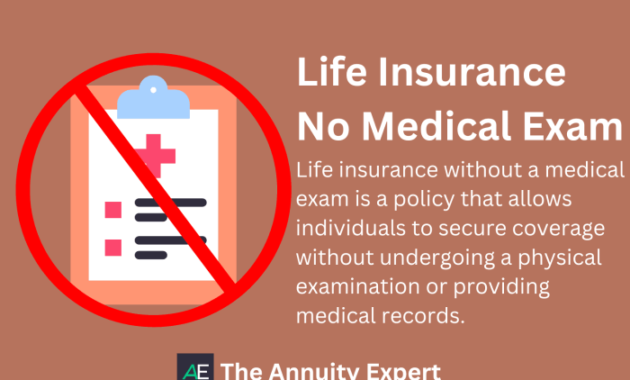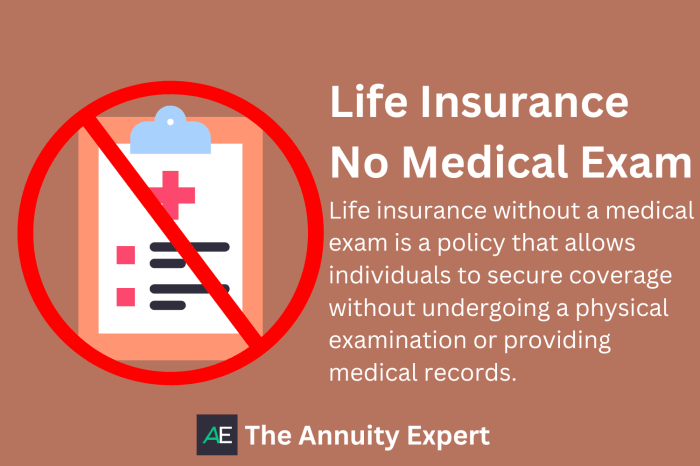
Navigating the landscape of life insurance can be complex, especially for seniors over 75. Traditional policies often require extensive medical examinations, posing a significant hurdle for many in this age group. However, a growing number of insurers offer policies that eliminate this barrier, providing valuable peace of mind without the need for invasive medical procedures. This exploration delves into the advantages, disadvantages, and practical considerations of life insurance for seniors over 75 that doesn’t require a medical exam, empowering you to make informed decisions about your financial future.
This guide will equip you with the knowledge necessary to understand the different types of policies available, compare costs and coverage, and effectively navigate the application process. We’ll also address common concerns and explore alternative financial planning strategies for those who may face challenges securing traditional life insurance.
Understanding Senior Life Insurance Needs (Over 75)
Securing life insurance after 75 presents unique challenges and considerations. While younger individuals often focus on long-term financial security and providing for dependents, seniors in this age group may have different priorities, often centered around estate planning, legacy preservation, and covering final expenses. Understanding these nuanced needs is crucial when exploring life insurance options.
The financial landscape for individuals over 75 is significantly different than for younger adults. Retirement income may be limited, and health expenses can be substantial. Many seniors are concerned about leaving a financial burden on their loved ones, including covering funeral costs, outstanding debts, and estate taxes. This concern often motivates the pursuit of life insurance, even at an advanced age.
Reasons for Seniors Over 75 to Need Life Insurance
Several compelling reasons exist for seniors over 75 to consider life insurance. The primary driver is often the desire to alleviate financial strain on family members following their passing. This can involve covering funeral and burial costs, outstanding medical bills, or even estate taxes. In some cases, life insurance can help preserve family assets, ensuring a smooth transition of inheritance.
Situations Where Life Insurance Benefits Seniors Over 75
Life insurance can be particularly beneficial in several specific situations for seniors over 75. For instance, a senior with significant outstanding debt, such as a mortgage or medical debt, might want life insurance to prevent this debt from falling on their heirs. Similarly, a senior who wants to leave a specific legacy, such as funding a grandchild’s education or a favorite charity, can use life insurance as a guaranteed method to achieve this goal. Finally, seniors who have complex estate plans or significant assets may utilize life insurance to help offset estate taxes, ensuring their heirs receive the maximum possible inheritance.
Types of Life Insurance for Seniors Over 75
Choosing the right type of life insurance is critical. Several options are available, each with its advantages and disadvantages. The best choice depends on individual circumstances and financial goals.
| Type of Life Insurance | Description | Pros | Cons |
|---|---|---|---|
| Simplified Issue Whole Life | Offers lifelong coverage with no medical exam required. Premiums are generally higher than term life insurance. | Guaranteed coverage, cash value accumulation, no medical exam. | Higher premiums compared to term life, lower death benefit for the same premium. |
| Simplified Issue Term Life | Provides coverage for a specified period (term), typically 10-30 years, without a medical exam. | Lower premiums than whole life, provides coverage for a specific period. | Coverage ends at the end of the term, no cash value accumulation. |
| Final Expense Insurance | Specifically designed to cover funeral and burial costs. Usually a small death benefit, often with simplified underwriting. | Affordable, specifically addresses final expenses. | Limited death benefit, may not cover other debts or legacies. |
No Medical Exam Policies

Securing life insurance after 75 can present challenges, but no medical exam policies offer a streamlined approach. These policies simplify the application process, making them attractive for seniors who may have health concerns or prefer to avoid medical evaluations. However, understanding both the advantages and disadvantages is crucial before making a decision.
Advantages of No Medical Exam Life Insurance for Seniors Over 75
The primary benefit of no medical exam life insurance for seniors over 75 is the convenience and speed of the application process. Applicants avoid the often-intrusive medical examinations, including blood tests and physicals, that are typical for traditional life insurance policies. This is particularly beneficial for seniors who may have mobility issues or pre-existing health conditions that make undergoing medical examinations difficult or stressful. Furthermore, the approval process is typically faster, allowing for quicker access to coverage. The simplicity of the application also reduces the potential for delays caused by medical information review and processing.
Disadvantages and Limitations of No Medical Exam Life Insurance for Seniors Over 75
While convenient, no-medical-exam policies typically come with limitations. The most significant drawback is usually a higher premium compared to policies requiring medical exams. Insurers assess a higher risk without the benefit of a medical evaluation, leading to increased costs for the consumer. Furthermore, the coverage amounts available through these policies are often lower than those offered with medical exam policies. This is because insurers need to mitigate the higher risk associated with the lack of medical information. Finally, there may be stricter underwriting guidelines, potentially leading to applications being denied based on factors revealed during the application process, such as lifestyle choices or pre-existing conditions.
Cost Comparison: No Medical Exam vs. Medical Exam Policies
The cost of life insurance is significantly impacted by the inclusion or exclusion of a medical exam. Understanding this difference is crucial for making an informed decision.
Below is a comparison of the typical cost differences:
- No Medical Exam Policies: Higher premiums due to increased risk for the insurer. Coverage amounts are generally lower. Application process is quicker and simpler.
- Medical Exam Policies: Lower premiums due to reduced risk assessment for the insurer. Coverage amounts are typically higher. Application process is longer and more complex.
Typical Coverage Amounts and Premiums for No Medical Exam Policies
The following table provides illustrative examples of coverage amounts and premiums offered by different hypothetical insurers for no-medical-exam policies for seniors over 75. These figures are for illustrative purposes only and should not be considered actual quotes. Individual premiums and coverage amounts will vary depending on factors such as age, health history (as disclosed in the application), and the specific insurer.
| Insurer | Age | Coverage Amount ($USD) | Annual Premium ($USD) |
|---|---|---|---|
| Insurer A | 78 | 25,000 | 800 |
| Insurer B | 75 | 50,000 | 1,500 |
| Insurer C | 80 | 10,000 | 300 |
| Insurer D | 77 | 30,000 | 1,000 |
Finding Suitable No-Medical-Exam Life Insurance
Securing life insurance after 75 can present unique challenges, but no-medical-exam policies offer a valuable solution for seniors seeking affordable coverage without the complexities of medical underwriting. This section details strategies for effectively navigating the search, selection, and application process for these policies.
Finding the right no-medical-exam life insurance policy requires careful consideration and proactive steps. Understanding the available options and comparing them based on key factors will help seniors make an informed decision that aligns with their individual needs and financial capabilities.
Factors to Consider When Selecting a Policy
Several key factors influence the suitability of a no-medical-exam life insurance policy. These factors should be carefully weighed to ensure the chosen policy provides adequate coverage at a manageable cost.
- Coverage Amount: Determine the appropriate death benefit to cover final expenses and leave a legacy for loved ones. This amount should consider outstanding debts, funeral costs, and other potential financial obligations. For example, a senior might aim for a policy providing sufficient funds to cover their estate taxes and ensure a comfortable inheritance for their heirs.
- Premiums: No-medical-exam policies often come with higher premiums compared to policies requiring medical examinations, reflecting the higher risk for the insurer. Compare premiums from different providers to find the most affordable option that still meets your coverage needs. Consider the overall cost over the policy’s term.
- Policy Terms: Understand the policy’s duration (term life insurance or whole life insurance), renewability options, and any limitations on benefits. For instance, some policies might offer a guaranteed renewable option, ensuring coverage regardless of health changes, albeit at potentially increasing premiums.
Step-by-Step Guide to Applying for a No-Medical-Exam Policy
The application process for no-medical-exam life insurance is generally straightforward. Following these steps will help ensure a smooth and efficient application.
- Research and Compare: Use online comparison tools or consult with an independent insurance agent to identify suitable policies.
- Complete the Application: Provide accurate and complete information on the application form, including details about your age, health history (to the extent required), and beneficiary information.
- Provide Necessary Documentation: This may include a copy of your driver’s license or other identification documents.
- Pay the First Premium: Once the application is approved, pay the initial premium to activate the policy.
- Review the Policy Documents: Carefully review the policy documents to ensure you understand the terms and conditions before signing.
Questions to Ask Insurance Agents
Before committing to a policy, it’s crucial to ask pertinent questions to clarify any uncertainties and ensure the policy aligns with your needs.
- What are the specific limitations of this no-medical-exam policy? This clarifies any exclusions or restrictions on coverage.
- What is the process for making a claim? Understanding the claims process beforehand prevents confusion later.
- Are there any additional fees or charges associated with this policy? This ensures transparency in the overall cost.
- What are the policy’s renewability options? Knowing whether the policy can be renewed and under what conditions is vital for long-term planning.
- What is the insurer’s financial stability rating? This assesses the insurer’s ability to pay claims in the future.
Factors Affecting Policy Approval and Premiums

Securing life insurance over 75, even without a medical exam, involves an underwriting process that considers various factors influencing both policy approval and premium costs. While a medical exam is bypassed, insurers still assess risk to determine eligibility and pricing. This assessment focuses on information you provide in your application.
Age’s Influence on Policy Approval and Premiums
Age is a significant factor. The older the applicant, the higher the perceived risk of mortality, leading to higher premiums or even potential denial. Insurers utilize actuarial tables reflecting the statistical probability of death within specific age brackets. For example, a 78-year-old applicant will generally face higher premiums than a 75-year-old applicant, reflecting the increased likelihood of a claim within the policy’s term. This is a fundamental principle of life insurance pricing.
Health History’s Impact Despite No Medical Exam
Even without a formal medical exam, your health history significantly influences policy approval and premium costs. The application requires detailed information about existing health conditions, past hospitalizations, surgeries, and medications. Pre-existing conditions, such as heart disease, diabetes, or cancer, will generally result in higher premiums or even a denial of coverage, depending on the severity and stage of the condition. The insurer uses this information to assess your longevity risk.
Lifestyle Choices and Their Effect
Lifestyle factors, such as smoking, excessive alcohol consumption, and dangerous hobbies, also play a crucial role. Applicants who engage in risky behaviors are considered higher risk and will typically pay higher premiums. Insurers may request additional information or even decline coverage if the applicant’s lifestyle is deemed too hazardous. For example, a smoker might be charged a substantially higher premium compared to a non-smoker of the same age and health status.
Underwriting Process for No-Medical-Exam Policies
The underwriting process for no-medical-exam policies relies heavily on the information provided in the application. Insurers may use algorithms and predictive models to assess risk based on this information. They may also access public records and databases to verify the accuracy of the data provided. This process aims to minimize the risk for the insurance company while offering coverage to seniors.
Reasons for Policy Denial or Higher Premiums
The following table Artikels common reasons leading to policy denial or increased premiums for no-medical-exam senior life insurance policies.
| Reason | Impact on Approval | Impact on Premium | Example |
|---|---|---|---|
| Pre-existing serious health condition (e.g., advanced cancer) | Potential denial | Substantially higher (if approved) | A diagnosis of stage 4 lung cancer may result in denial. |
| Recent hospitalizations or surgeries | Potential denial or higher premiums | Higher | Recent heart surgery could lead to higher premiums or denial, depending on the insurer and circumstances. |
| History of substance abuse | Potential denial or higher premiums | Higher | A history of alcohol abuse could lead to a higher premium or even denial of coverage. |
| High-risk lifestyle (e.g., dangerous hobbies) | Potential denial or higher premiums | Higher | Frequent skydiving could lead to higher premiums or even denial. |
Alternative Options for Seniors with Health Concerns

Securing life insurance can be challenging for seniors over 75, especially those with pre-existing health conditions. Denial of coverage is a common outcome, leaving many to explore alternative financial planning strategies to ensure their loved ones are protected. These alternatives may not directly replace the death benefit provided by life insurance, but they can offer valuable financial security in different ways.
Financial Strategies to Supplement Life Insurance
Several financial strategies can help seniors over 75 who cannot obtain life insurance due to health issues. These strategies aim to provide financial support for their beneficiaries, addressing concerns that would otherwise be covered by a life insurance policy. The choice of strategy depends on individual circumstances, financial resources, and specific needs.
Asset Allocation and Estate Planning
Careful management of existing assets is a crucial element of financial planning for seniors, especially in the absence of life insurance. This involves strategically allocating assets to maximize their value and ensure a smooth transfer to beneficiaries. For example, a senior might adjust their investment portfolio to favor less risky, income-generating assets, ensuring a steady stream of funds to support their needs and leaving a larger estate for their heirs. Estate planning techniques like trusts and wills can also play a vital role in controlling how assets are distributed after death, minimizing potential tax burdens and legal complications. This proactive approach mitigates the absence of a life insurance death benefit by ensuring that available assets are utilized effectively for the benefit of loved ones.
Gifting Assets
Gifting assets to beneficiaries while the senior is still alive is another option. This can reduce the overall estate tax burden and allow beneficiaries to access the funds earlier. However, it’s important to consult with a tax advisor to understand the implications of gifting, including potential gift tax implications and the impact on eligibility for government assistance programs. Careful planning is crucial to ensure the gift does not jeopardize the senior’s financial security. For example, a senior might gift a portion of their savings or real estate to their children, ensuring they have financial security after the senior’s passing, even without a life insurance payout. The potential downside is the loss of access to these gifted assets for the senior’s own needs.
Increased Savings and Investments
Seniors might choose to allocate a larger portion of their income towards savings and investments, building a larger estate to compensate for the lack of a life insurance death benefit. This could involve increasing contributions to retirement accounts, investing in low-risk securities, or establishing a dedicated fund for their beneficiaries. The benefits are obvious – increased financial security for both the senior and their beneficiaries. However, the time horizon for building a significant estate may be limited for those over 75, making this a less impactful strategy compared to life insurance.
Pre-paid Funeral Arrangements
Pre-paying funeral and burial expenses eliminates a significant financial burden from the beneficiaries after the senior’s death. This is a practical way to ensure their final wishes are met without impacting their family’s financial stability. The main advantage is the peace of mind for both the senior and their loved ones, knowing these costs are covered. The disadvantage is that the funds are not available for other needs, and the cost of pre-paid funeral arrangements can fluctuate over time.
Illustrating the Importance of Planning
Planning for the future, particularly concerning financial security in later life, is crucial for seniors over 75. While unforeseen circumstances can always arise, proactive measures like securing life insurance can significantly mitigate potential financial burdens on loved ones and ensure a smoother transition for the family. Failing to plan can leave a considerable legacy of debt and hardship.
The potential financial impact of having life insurance versus not having it for seniors over 75 can be substantial. Consider this hypothetical scenario: Mr. Jones, 78, passes away unexpectedly. He owned his home outright, but also had significant outstanding debts, including a remaining mortgage balance on a vacation property, medical bills, and unpaid taxes totaling $150,000. His wife, Mrs. Jones, is 76 and solely reliant on her Social Security income.
Financial Impact of Life Insurance
Let’s examine the financial outcomes with and without life insurance. Without life insurance, Mrs. Jones would face an immediate and overwhelming financial crisis. She would likely be forced to sell her home, potentially facing a significant loss depending on market conditions, to cover the debts. This would leave her with drastically reduced living standards and increased stress in her later years. She might need to rely heavily on family members for financial assistance, creating additional burdens for them.
Conversely, if Mr. Jones had a $150,000 life insurance policy, the death benefit would cover his outstanding debts in full. Mrs. Jones would inherit the house debt-free, maintaining her living situation and quality of life. This would allow her to maintain financial independence and avoid the emotional and logistical strain of selling her home and managing a sudden financial crisis.
Visual Representation of Financial Security
Imagine a simple bar graph. The horizontal axis represents two scenarios: “Without Life Insurance” and “With Life Insurance”. The vertical axis represents financial assets (in dollars).
For “Without Life Insurance,” the bar would be short, reflecting Mrs. Jones’s reduced assets after debt payments—potentially even negative, indicating debt. This bar would be labeled with an estimated value representing the net worth after debt settlement. Perhaps, it would be -$50,000, indicating significant debt after selling assets to pay off debts.
For “With Life Insurance,” the bar would be much taller, representing Mrs. Jones’s assets after receiving the life insurance payout and settling the debts. This bar would be labeled with a positive value, perhaps $100,000, reflecting the value of the house plus any remaining savings. This clearly demonstrates the significant financial cushion provided by life insurance, ensuring a stable financial future for the surviving spouse. The visual contrast highlights the stark difference between these two scenarios, emphasizing the importance of planning and securing adequate life insurance coverage.
Last Point
Securing life insurance after 75, without a medical exam, offers a unique opportunity to provide financial security for loved ones while simplifying the process. By carefully considering your individual needs, comparing policy options, and understanding the factors influencing premiums, you can confidently navigate this important decision. Remember to seek professional advice when necessary to ensure you choose a policy that aligns perfectly with your circumstances and financial goals. Planning for the future, even at this stage of life, provides invaluable peace of mind.
FAQ Explained
What is the difference between term life and whole life insurance for seniors over 75?
Term life insurance provides coverage for a specific period (term), while whole life insurance offers lifelong coverage. Whole life policies typically have higher premiums but build cash value over time.
How much coverage can I expect to receive without a medical exam?
Coverage amounts vary greatly depending on the insurer, your age, and other factors. Generally, expect lower coverage amounts compared to policies requiring medical exams.
Can I still get life insurance if I have pre-existing health conditions?
Yes, but it may impact your eligibility and premiums. Insurers will assess your health history even without a medical exam, potentially leading to higher premiums or denial of coverage.
What if my application is denied?
If your application is denied, explore alternative options such as final expense insurance or other financial planning strategies. You may also want to reapply with a different insurer.